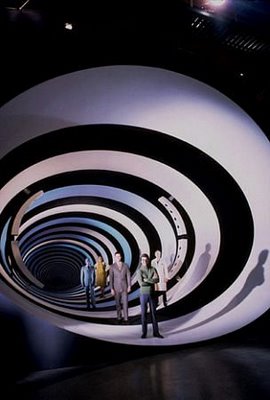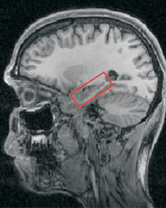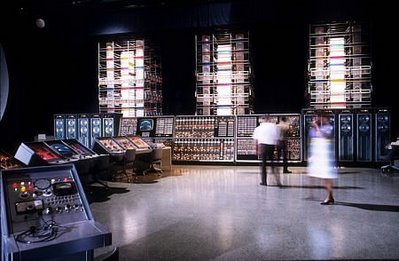Neuroscience

"The Time Tunnel" (1966)
Endel Tulving, that Great Canadian Psychology Researcher and memory theorist, has long held that episodic memory, or the vivid recollection of events and their associated spatiotemporal contextual details, affords humans the unique ability to engage in mental time travel:
So what's new and exciting? Here's a question: must we be able remember the past to envision the future? The answer is yes, according to a recent study conducted in amnesic patients with damage to the hippocampus (Hassabis et al., 2007). As reported in Science's News of the Week:
 The Janus center? The hippocampus (red box) may be as important for imagining the future as it is for remembering the past. CREDIT: ELEANOR MAGUIRE
The Janus center? The hippocampus (red box) may be as important for imagining the future as it is for remembering the past. CREDIT: ELEANOR MAGUIRE
More press coverage:
Amnesiacs May Be Cut Off From Past and Future Alike
. . . The results suggest that to the brain, remembered experience and imagined experience are reflections from the same mirror, rich inner worlds animated by almost identical neural networks.
Hmm, aren't these findings exaggerated just a little bit, Mr. Carey? Fortunately, one of the authors puts the results into a better context:
The amnesic and control participants were given cue sentences (e.g., "Imagine you're lying on a white sandy beach in a beautiful tropical bay") and asked to vividly imagine such a scene, describing it using as much detail as possible. They were told not to recount an actual memory, but to create something new. [NOTE: how do you verify that non-amnesic subjects avoided describing actual memories of such a scene?] At any rate, the amnesic patients did, indeed, perform more poorly than controls on this task.
References
Bayley PJ, Hopkins RO, Squire LR. (2003). Successful recollection of remote autobiographical memories by amnesic patients with medial temporal lobe lesions. Neuron 38: 135-44.
Bayley PJ, Hopkins RO, Squire LR. (2006). The fate of old memories after medial temporal lobe damage. J Neurosci. 26:13311-7.
Clayton NS, Bussey TJ, Dickinson A. (2003). Can animals recall the past and plan for the future? Nat Rev Neurosci 4: 685-91.
Dere E, Kart-Teke E, Huston JP, De Souza Silva MA. (2006). The case for episodic memory in animals. Neurosci Biobehav Rev 30:1206-24.
Emery NJ, Clayton NS. (2004). The mentality of crows: convergent evolution of intelligence in corvids and apes. Science 306: 1903-7.
Kapur S, Craik FI, Jones C, Brown GM, Houle S, Tulving E. (1995). Functional role of the prefrontal cortex in retrieval of memories: a PET study. Neuroreport 14:1880-4.
Kim, A (2007). Which brain regions enable us to remember our past and anticipate our future? Sci Consciousness Rev.
Nadel L, Moscovitch M. (1997). Memory consolidation, retrograde amnesia and the hippocampal complex. Curr Opin Neurobiol. 7: 217-27.
O'Keefe J, Dostrovsky J. (1971). The hippocampus as a spatial map. Preliminary evidence from unit activity in the freely-moving rat. Brain Res. 34:171-5.
O'Keefe J, Nadel L. (1978). The Hippocampus as a Cognitive Map. Oxford University Press.
Steinvorth S, Corkin S, Halgren E. (2006). Ecphory of autobiographical memories: an fMRI study of recent and remote memory retrieval. Neuroimage 30: 285-98.
Suddendorf T, Corballis MC. (1997). Mental time travel and the evolution of the human mind. Genet Soc Gen Psychol Monogr 123: 133-67.
Wheeler MA, Stuss DT, Tulving E. (1997). Toward a theory of episodic memory: the frontal lobes and autonoetic consciousness. Psychol Bull 121:331-54.
Zentall TR. (2006). Mental time travel in animals: a challenging question. Behav Processes 72: 173-83.
 "The Time Tunnel" (1966)
"The Time Tunnel" (1966)
- Fables Of The Reconstruction
A flurry of papers (well, OK, three) has been published recently on the relationship between how we remember the past and imagine the future. The third and final paper is another functional neuroimaging study (Addis et al., 2007). Before we begin, let’s...
- I Miss You But I Haven't Met You Yet
i miss you but i haven't met you yet so special but it hasn't happened yet you are gorgeous but i haven't met you yet i remember but it hasn't happened yet -- Björk, I Miss You Remembering The Past, Envisioning The Future As Björk...
- Amnestic Syndromes: The Play's The Thing ...
From today's New York Times: January 23, 2007 Amnesiacs May Be Cut Off From Past and Future Alike By BENEDICT CAREY The New York Times In the movies amnesia is bizarre, and thrilling. The star is usually a former assassin or government agent whose...
- Drs. Brenda Milner And Endel Tulving Honored
From The Globe and Mail:Award recognizes Canadian memory research Cognitive neuroscientists Brenda Milner of McGill University in Montreal and Endel Tulving of the University of Toronto are recipients of the 2005 Gairdner Awards By JORDAN PRESS Saturday,...
- Difference Between The Future & The Past?
New Scientist reports on several studies which suggest that there may not be such a difference between the future and the past, at least in our brains. From the free abstract on the New Scientist web site, author Jessica Marshall writes: "IMAGINE your...
Neuroscience
Mental Time Travel

"The Time Tunnel" (1966)
Endel Tulving, that Great Canadian Psychology Researcher and memory theorist, has long held that episodic memory, or the vivid recollection of events and their associated spatiotemporal contextual details, affords humans the unique ability to engage in mental time travel:
What makes mental time travel possible?As a side note, the view that chronesthesia (Kim, 2007) or autonoetic consciousness (Wheeler et al., 1995), or ecphory (Kapur et al., 1995; Steinvorth et al., 2006) are distinctly human abilities has not gone without debate (Clayton et al., 2003; Dere et al., 2006; Emery et al., 2004; Suddendorf et al., 1997; Zentall, 2006).
Psychologist Endel Tulving offered a theory on our uniquely human ability to act today based on our past and future.
BY BRIDGET MURRAY
Remembering, to most of us, means recalling a past occurrence. But to Endel Tulving, PhD, the mechanisms of memory evoke the future as well. The reason? Memory allows us to mentally travel backward in time as well as into the future, explained Tulving, a University of Toronto professor emeritus and visiting professor in cognitive neuroscience at Washington University, in a presidential invited address at APA's 2003 Annual Convention in Toronto.
Tulving's theory stems from extensive memory research he's conducted since the 1950s at Toronto, Yale University and the Toronto-based Rotman Research Institute--and, he said, others' research supports it too. He proposed an official term for, and definition of, what makes such mental time travel possible:
Chronesthesia--A hypothetical brain/mind ability or capacity, acquired by humans through evolution, that allows them to be constantly aware of the past and the future.
So what's new and exciting? Here's a question: must we be able remember the past to envision the future? The answer is yes, according to a recent study conducted in amnesic patients with damage to the hippocampus (Hassabis et al., 2007). As reported in Science's News of the Week:
A Surprising Connection Between Memory and Imagination
Greg Miller
According to a new study, people with amnesia caused by damage to the hippocampus, a brain region intimately tied to memory, have difficulty envisioning commonplace scenarios they might reasonably expect to encounter in the future. The findings challenge long-held views about the function of the hippocampus and the nature of memory.
 The Janus center? The hippocampus (red box) may be as important for imagining the future as it is for remembering the past. CREDIT: ELEANOR MAGUIRE
The Janus center? The hippocampus (red box) may be as important for imagining the future as it is for remembering the past. CREDIT: ELEANOR MAGUIREMore press coverage:
Amnesiacs May Be Cut Off From Past and Future Alike
. . . The results suggest that to the brain, remembered experience and imagined experience are reflections from the same mirror, rich inner worlds animated by almost identical neural networks.
Hmm, aren't these findings exaggerated just a little bit, Mr. Carey? Fortunately, one of the authors puts the results into a better context:
"We think that what the hippocampus provides is a scaffold for experience and imagination, and that scaffold is spatial," Maguire said. The brain's record of physical space, she said, appears to be necessary to infuse a scene with rich personal dimension.Five people with amnesia participated in the study. These individuals had contracted limbic encephalitis or meningitis that resulted in brain damage that appeared to extend to regions beyond the hippocampus proper. Memory loss was not only anterograde (an inability to encode new information) but also substantially retrograde (loss of remote autobiographical memories), extending from 10 years premorbidly to the entire lifetime for one person. These folks are not your classic cases of hippocampal amnesia (e.g., see Bayley et al., 2006), because their retrograde memory impairments are much more severe. This blows up yet another controversy swirling around the importance of the hippocampus in the retrieval of remote memories (important: Nadel & Moscovitch, 1997; not: Bayley et al., 2003).
The amnesic and control participants were given cue sentences (e.g., "Imagine you're lying on a white sandy beach in a beautiful tropical bay") and asked to vividly imagine such a scene, describing it using as much detail as possible. They were told not to recount an actual memory, but to create something new. [NOTE: how do you verify that non-amnesic subjects avoided describing actual memories of such a scene?] At any rate, the amnesic patients did, indeed, perform more poorly than controls on this task.
Hassabis D, Kumaran D, Vann SD, Maguire EA. (2007). Patients with hippocampal amnesia cannot imagine new experiences. Proc Natl Acad Sci 104: 1726-31.
Amnesic patients have a well established deficit in remembering their past experiences. Surprisingly, however, the question as to whether such patients can imagine new experiences has not been formally addressed to our knowledge. We tested whether a group of amnesic patients with primary damage to the hippocampus bilaterally could construct new imagined experiences in response to short verbal cues that outlined a range of simple commonplace scenarios. Our results revealed that patients were markedly impaired relative to matched control subjects at imagining new experiences. Moreover, we identified a possible source for this deficit. The patients' imagined experiences lacked spatial coherence, consisting instead of fragmented images in the absence of a holistic representation of the environmental setting. The hippocampus, therefore, may make a critical contribution to the creation of new experiences by providing the spatial context into which the disparate elements of an experience can be bound. Given how closely imagined experiences match episodic memories, the absence of this function mediated by the hippocampus, may also fundamentally affect the ability to vividly re-experience the past.
Back in 1978, John O'Keefe and Lynn Nadel published a book called The Hippocampus as a Cognitive Map. [now freely available!] In it, they built a theory of hippocampal function around the existence of place cells (O'Keefe & Dostrovsky, 1971) and theta activity (Vanderwolf, 1969). [We'll leave theta aside for now.] Place cells are hippocampal neurons that show increased firing rates whenever an animal is in a specific location in the environment - the cell's "place field."
As for hard scientific evidence of chronesthesia's existence, there's "zero, none, very little--it's just an idea," said Tulving. But, he said, emerging imaging research promises to help shed light on its brain mechanisms and has already suggested that higher-order thinking regions, such as the prefrontal cortex, are involved.You can also find some interesting commentary about the role of hippocampus in Imagination and memory over at Gene Expression.
He admonished, however, that no function--chronesthesia or any other--"holds a particular seat in the brain; it's all over the place."
References
Bayley PJ, Hopkins RO, Squire LR. (2003). Successful recollection of remote autobiographical memories by amnesic patients with medial temporal lobe lesions. Neuron 38: 135-44.
Bayley PJ, Hopkins RO, Squire LR. (2006). The fate of old memories after medial temporal lobe damage. J Neurosci. 26:13311-7.
Clayton NS, Bussey TJ, Dickinson A. (2003). Can animals recall the past and plan for the future? Nat Rev Neurosci 4: 685-91.
Dere E, Kart-Teke E, Huston JP, De Souza Silva MA. (2006). The case for episodic memory in animals. Neurosci Biobehav Rev 30:1206-24.
Emery NJ, Clayton NS. (2004). The mentality of crows: convergent evolution of intelligence in corvids and apes. Science 306: 1903-7.
Kapur S, Craik FI, Jones C, Brown GM, Houle S, Tulving E. (1995). Functional role of the prefrontal cortex in retrieval of memories: a PET study. Neuroreport 14:1880-4.
Kim, A (2007). Which brain regions enable us to remember our past and anticipate our future? Sci Consciousness Rev.
Nadel L, Moscovitch M. (1997). Memory consolidation, retrograde amnesia and the hippocampal complex. Curr Opin Neurobiol. 7: 217-27.
O'Keefe J, Dostrovsky J. (1971). The hippocampus as a spatial map. Preliminary evidence from unit activity in the freely-moving rat. Brain Res. 34:171-5.
O'Keefe J, Nadel L. (1978). The Hippocampus as a Cognitive Map. Oxford University Press.
Steinvorth S, Corkin S, Halgren E. (2006). Ecphory of autobiographical memories: an fMRI study of recent and remote memory retrieval. Neuroimage 30: 285-98.
Suddendorf T, Corballis MC. (1997). Mental time travel and the evolution of the human mind. Genet Soc Gen Psychol Monogr 123: 133-67.
Wheeler MA, Stuss DT, Tulving E. (1997). Toward a theory of episodic memory: the frontal lobes and autonoetic consciousness. Psychol Bull 121:331-54.
Zentall TR. (2006). Mental time travel in animals: a challenging question. Behav Processes 72: 173-83.
 "The Time Tunnel" (1966)
"The Time Tunnel" (1966)- Fables Of The Reconstruction
A flurry of papers (well, OK, three) has been published recently on the relationship between how we remember the past and imagine the future. The third and final paper is another functional neuroimaging study (Addis et al., 2007). Before we begin, let’s...
- I Miss You But I Haven't Met You Yet
i miss you but i haven't met you yet so special but it hasn't happened yet you are gorgeous but i haven't met you yet i remember but it hasn't happened yet -- Björk, I Miss You Remembering The Past, Envisioning The Future As Björk...
- Amnestic Syndromes: The Play's The Thing ...
From today's New York Times: January 23, 2007 Amnesiacs May Be Cut Off From Past and Future Alike By BENEDICT CAREY The New York Times In the movies amnesia is bizarre, and thrilling. The star is usually a former assassin or government agent whose...
- Drs. Brenda Milner And Endel Tulving Honored
From The Globe and Mail:Award recognizes Canadian memory research Cognitive neuroscientists Brenda Milner of McGill University in Montreal and Endel Tulving of the University of Toronto are recipients of the 2005 Gairdner Awards By JORDAN PRESS Saturday,...
- Difference Between The Future & The Past?
New Scientist reports on several studies which suggest that there may not be such a difference between the future and the past, at least in our brains. From the free abstract on the New Scientist web site, author Jessica Marshall writes: "IMAGINE your...
